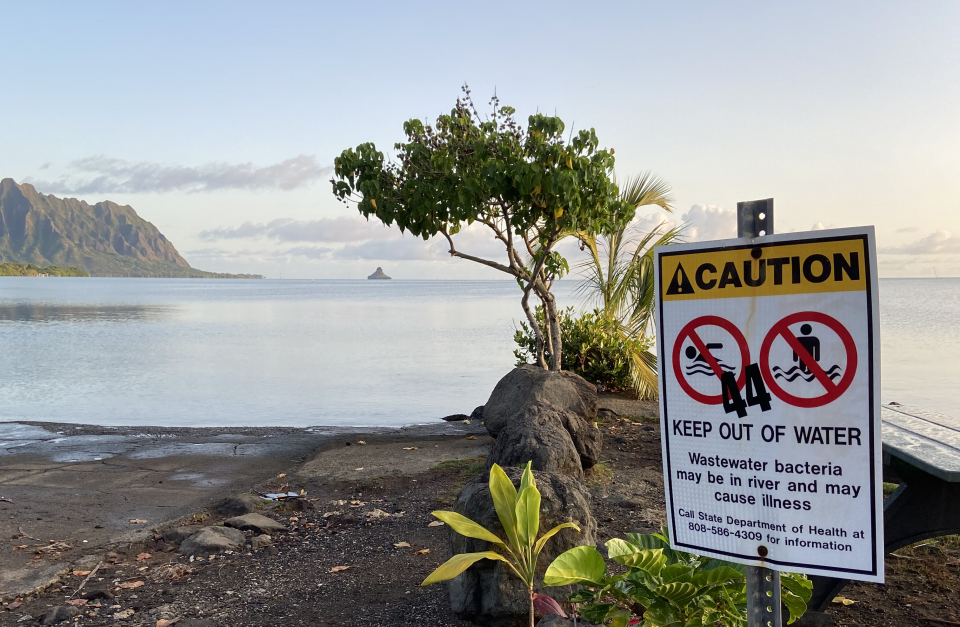Hawaii Legislature Delivers Mixed Bag On Climate, Environment Solutions
Lawmakers punted on key cesspool measures, but they made some progress on conservation and the state's zero-emission goals.
By Marcel Honore / About 11 hours ago
Reading time: 5 minutes.
This year’s legislative session drew varied results for better protecting Hawaii’s environment and addressing the effects of climate change.
Key measures related to cesspools and visitors’ impacts that seemed to have widespread support and momentum failed to pass. But state lawmakers pointed to several accomplishments, and said they would try again next year to finally pass a visitor “green fee” and more aggressively tackle Hawaii’s rampant cesspool problem.
“Really shitty,” Sen. Mike Gabbard said of the Legislature’s failure to pass a measure to address cesspools that spill some 53 million gallons of untreated sewage into the islands’ soil, streams and nearshore waters each day.
A sign warns of health hazards at Kahaluu due to cesspool pollution. (Courtesy: Surfrider Foundation/2022)
House Bill 1396 would have targeted the state’s 83,000 cesspools on multiple fronts to hasten their conversion into cleaner sewage treatment systems after a state working group recently concluded after a four-year study that Hawaii cannot wait another 30 years to scrap them as planned.
The bill abruptly died on the final afternoon of conference hearings last week.
“Disappointed is an understatement. Let me put it that way,” said Gabbard, who chairs the Senate Agriculture and Environment Committee. “Lots of different people … put their heart and their soul into this thing. It’s not like this is a manini thing. It’s a huge problem we have, and it’s affecting all of us.”
Rep. Nicole Lowen, who chairs the House Energy and Environmental Protection Committee, expressed similar disappointment.
Neither she nor Gabbard knew exactly why the bill failed at the 11th hour, but it was one of a flurry of bills that died amid a last-minute and fairly chaotic “cattle-call” session.
HB 1396 was a top priority, and lawmakers had “healthy discussions” about the measure, Lowen said. But some of those lawmakers also had concerns about committing large amounts of money without first talking to the counties about “stepping up to do their part,” she added.
Gabbard and Lowen were also both disappointed that legislation prohibiting the manufacture and sale of toxic chemicals known as PFAS in the sale of food packaging and personal care products also failed.
PFAS, or so-called “forever chemicals,” have been detected at levels far above what the federal government considers safe in community water systems in Kunia and Waipio. They’ve also been found in the Navy’s Pearl Harbor drinking water system and various military sites across Oahu.
On Friday, the military released an investigation that found lax oversight by the Navy and mistakes by a contractor led to a severe spill of PFAS at the Red Hill fuel facility in November.
Wins, Losses On Solar
Lowen further lamented that HB 346, which would require future state facilities be ready to support electric vehicle charging, and HB 1326, which aims to reduce Hawaii’s waste stream, failed to pass.
Another bill, SB 781, would have streamlined the state’s permitting process to install rooftop and commercial solar power systems – but it failed to pass as well.
“We still are trying to figure out exactly what happened,” she said of that measure.
Lowen was encouraged, however, that the Legislature included $100 million in the state budget for the Hawaii Green Infrastructure Authority to help finance the installation of more solar and battery energy systems for low-income households.
She also pointed to the extra millions of dollars in the budget to help better protect Hawaii’s natural resources, including its parks and its trails, as a positive step forward.
A Kaiwi Coast State Park?
Lawmakers also bolstered Oahu’s scenic Ka Iwi Coast against future development by passing SB 1254. The measure follows decades of community activism to protect that coastline against development projects, and it requires state officials to petition the Board of Land and Natural Resources to establish a Kaiwi Coast State Park.
The bill is framed that way because the Legislature cannot direct the board to take a policy action, said Sen. Chris Lee, who introduced it.
There’s language in the bill that “locks in the preservation and the protection of the area forever,” Lee said. “That then allows us as a community to move forward with the next steps, which is how do we properly manage this.”
Another measure that passed this year, SB 1024, will have the state and private sector actors work together more closely to remove all carbon emissions from Hawaii’s transportation sector, part of the state’s ambitious goal to go carbon-negative by 2045.
Transportation across land, air and sea represents some 60% of Hawaii’s total carbon emissions, said Lee, who also introduced that bill. The measure creates two working groups – one that focuses on ground transportation and another that focuses on the state’s unique interisland transportation by sea and air.
Prominent companies such as Matson, Young Bros. and Hawaiian Airlines want to transition to carbon-neutral modes of transportation but “often these things are being done in silos,” Lee said. SB 1024 would have them better coordinate those efforts, he added.
It could also help the companies currently developing innovative, electric-powered aircraft and sea gliders to eventually operate interisland service in Hawaii, he said.
“This is setting the framework for how to do that,” Lee said.
Gabbard said that overall the session amounted to a mixed bag for environment- and climate-related measures.
“One of the things I’ve learned about this process is it takes patience and determination,” he said Friday. Sometimes it can take a bill four or five years to finally pass.
“Back to the drawing board,” he said.

